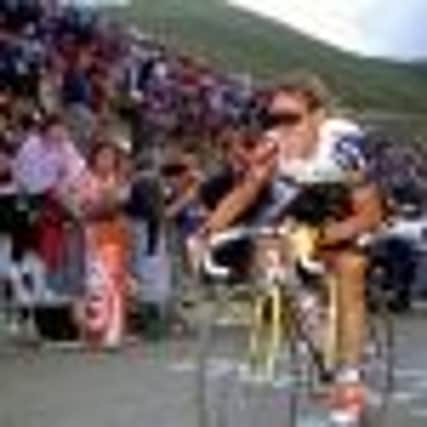Cycling: It’s Millar time


WHEN the inaugural Robert Millar Sportive sets off from Kirkintilloch this morning, on a loop that includes many of the roads that this country’s greatest cyclist trained on, it is inevitable that Millar himself will not be waving them off.
And yet, although physically absent, he will be there in spirit, having given his backing to the event, and lent his name. It is thought that Millar, whose crowning achievement was fourth overall and the King of the Mountains title at the 1984 Tour de France, has not been back to Scotland since 1998, when he managed the national team at the PruTour, and his absence has meant that his name and achievements are in danger of being, if not forgotten, then certainly overlooked.
Advertisement
Hide AdAdvertisement
Hide AdThe Sportive, organised by Millar’s old club, Glasgow Wheelers, represents a welcome effort to honour their most distinguished ex-member, as well as an attempt to surf the wave of interest in the sport, particularly in this type of event. Part race, part mass participation ride, sportives have blossomed over the past decade, with Scotland’s biggest, Etape Caledonia, drawing 5,000 amateur riders to the closed roads of Perthshire a fortnight ago.
The Robert Millar Sportive, over circuits of 95 or 46 miles, is on a smaller scale. But arguably the biggest achievement was to get Millar on board, albeit in absentia, and for this the credit belongs to Billy Bilsland and Brian Smith, who are among a handful of people from the cycling world still in contact with Millar.
Bilsland, whose bike shop in Glasgow’s east end still has Millar’s polka-dot King of the Mountains jersey hanging on its wall, was a professional on the continent in the 1970s and then acted as Millar’s coach and mentor, encouraging him to go to France to try his luck in 1979. A decade later, Millar himself became a mentor to Smith, the Paisley rider who rode as a professional in the 1990s. More recently, Smith established the Braveheart Fund to support young Scottish cyclists, for which today’s event will raise money.
There is an intriguing, even paradoxical, aspect to the association between Millar and a mass participation ride. Although sportives didn’t exist in his day, club runs – group rides that were as much social activity as training exercise – did. And it was on these that Millar first developed – perhaps even cultivated – his reputation as a single-minded and solitary individual.
The Glasgow club runs used many of the same roads as today’s sportive: the Campsie hills, the Trossachs and Loch Katrine were popular routes, as was Loch Lomond. Towards the end, these outings would include a “drum-up”, with the riders downing their bikes and sitting around a fire, on which soup would be heated and tea brewed.
In researching my biography of Millar I interviewed John Storrie, who ran Millar’s first club, the Glenmarnock Wheelers, and introduced hundreds of youngsters to the sport and to the ritual of the club run. Storrie, who died last year, recalled the young Millar, with his shoulder-length hair: “He liked to be different. On the club runs we would have drum-ups by the side of Loch Lomond, so we’d all stop and make a fire and sit down together. But Robert would go away on on his own, maybe 50 yards away, and light his own fire. He did that every time. He was a loner.”
Most agree with that description, but another Millar paradox is that he went on to excel, and to enjoy a 15-year career, in a sport that, at the professional level, is not an individual endeavour, but organised along team lines. With the French Peugeot squad he rose to the role of leader, winning two stages of the Tour de France in the Pyrenees in 1983 and ’84, finishing second in the Tour of Spain in 1985 and ’86, then, with the Dutch Panasonic team, placing second in the Giro d’Italia in 1987, and, back with Z-Peugeot, winning a third Pyrenean stage of the Tour in 1989. The following year he won one of France’s biggest races, the Dauphiné Libéré, also won by Bradley Wiggins last year.
It is fascinating to speculate how Millar would have fared with the kind of support that Wiggins now enjoys with Team Sky. As Bilsland has said, Millar did it all himself, which, back then, was not easy for a foreign rider in a foreign team. In a recent interview with the BBC to publicise today’s event, Bilsland was unequivocal: “If [Millar] had the backing the Sky team have now he would have won the Tour. I’m sure of that.”
Advertisement
Hide AdAdvertisement
Hide AdMany would agree. His fourth place finish at the 1984 Tour is the equal-highest ever by a British rider, with Wiggins matching it in 2009. Perhaps more remarkably, he remains the only English-speaking rider ever to be crowned King of the Mountains.
He deserves more recognition. Whether he wants it is another matter. But today’s event should at least ensure that more become aware of his name, and his truly extraordinary career.